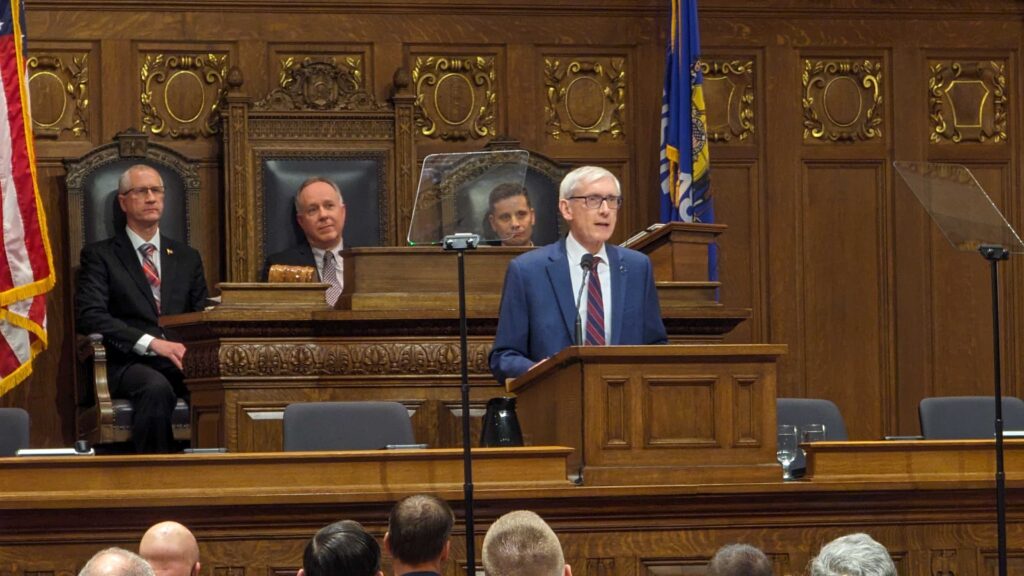Evers Will Offer Free Contraceptives for Badger Care Recipients
Governor proposes state initiatives on mental health and reproductive care.

Wisconsin Gov. Tony Evers address the Legislature in his 2024 State of the State message. (Baylor Spears | Wisconsin Examiner)
Gov. Tony Evers said Tuesday evening that his administration will issue a standing order to guarantee BadgerCare Plus patients access to over-the-counter contraception and unveiled plans to ramp up Wisconsin’s response to address “significant” mental health challenges.
Evers’ announcement, made during his State of the State address in the Capitol, came on the heels of Republican lawmakers’ latest abortion ban proposal, which Evers vowed to veto. He announced that he would direct the state Department of Health Services (DHS) to issue a standing order that BadgerCare Plus can be treated as a prescription to cover over-the-counter contraception, including emergency contraception.
The decision is, in part, a reaction to the U.S. Food and Drug Administration recent approval of the first daily, oral contraceptive pill for use without a prescription. The pill is expected to be available online and in stores later this year. BadgerCare Plus, Wisconsin’s Medicaid program for low-income families, currently covers over-the-counter emergency contraception and daily contraception but requires a prescription from a provider.
“Every Wisconsinite should be able to access the health care they need when they need it. And, yes, that includes contraception,” Evers stated in prepared remarks. “Once this contraception is out on the shelves, an individual on BadgerCare Plus will be able to go to any pharmacy and pick up the contraception they need. The pharmacy will use DHS’ standing order to process their insurance coverage. That individual will be able to leave the pharmacy with the medication they need at no out-of-pocket cost.”
Evers once again pushed Republican lawmakers to take action to expand postpartum Medicaid coverage to a year after giving birth from the current 60 days. Wisconsin is one of four states in the U.S. that hasn’t accepted the Medicaid postpartum expansion and doesn’t have plans to expand it.
The bill — SB 110 — that would accomplish this passed the Senate with nearly unanimous support, but the Assembly has not taken it up in part due to opposition from Assembly Speaker Robin Vos (R-Rochester). The bill has a growing list of Assembly cosponsors with the addition of Rep. Paul Melotik (R-Grafton) on Tuesday, bringing the total to 59.
“Pregnant women in Wisconsin up to certain income levels are eligible for BadgerCare Plus for the term of their pregnancy and up to 60 days after they give birth. But, as most people know, recovery time from a pregnancy often lasts longer than 60 days,” Evers said. “Tonight, I’m urging Republicans and Democrats to work together to get this bill across the finish line this session and to send it to my desk. We have to get this done.”
Democrats and advocates also recently urged Vos to allow the bill to go to the floor for a vote, saying it would help address poor maternal outcomes and racial disparities in maternal health care in Wisconsin.
Evers also announced the creation of an Interagency Council on Mental Health to address what he described as an ongoing crisis. The council will be tasked with creating a statewide plan that addresses prevention; increases awareness; reduces stigma; ensures access and affordability of quality care; and builds capacity among caregivers, providers and community partners to address the mental health crisis.
“I said here last year that I feared the state of mental health in Wisconsin was a quiet, burgeoning crisis—one I still believe will have cascading effects for generations if it goes unaddressed,” Evers stated in prepared remarks.
During last year’s State of the State address, Evers declared 2023 the “Year of Mental Health.” Reflecting on actions taken since then, he said that some important work surrounding mental health was achieved, including in the budget passed by Republican lawmakers and that he signed allocating $30 million to the “Get Kids Ahead” program. The initiative provides funding to public and independent charter schools in Wisconsin so they can build their mental health services.
But Evers emphasized that there is more work to be done.
“I don’t need to remind this Legislature that I requested more than $500 million last year to help expand access to mental and behavioral health services statewide, only a fraction of which was approved,” Evers said. “One year after declaring the Year of Mental Health, I’ll tell you tonight, as governor and as a grandfather, my concerns have not changed, and my fears have not waned.”
The latest annual report from the Office of Children’s Mental Health (OCMH) found that Wisconsin children continue to deal with extremely concerning levels of anxiety, depression, self-harm and suicidal thoughts, especially among girls, children of color and LGBTQ youth.
According to the report, about 34% of high school students in Wisconsin experience feelings of sadness and hopelessness nearly every day, and the number of youths experiencing a serious episode of depression increased from last year’s rate of one in seven to approximately one six. Nearly half of all LGBTQ youth in Wisconsin seriously considered killing themselves, which is higher than the national rate.
“Our state’s mental health challenges are significant. Let’s do more to make a difference on this issue in 2024,” Evers said. “We have to.”
Apart from the statewide plan, the council will also review current programs, including those created using federal American Rescue Plan Act funds, to find a way to expand them and make them sustainable. It will also aim to develop additional proposals to address the root causes of the mental health crisis, strengthen partnerships to address mental health across state agencies and between agencies and others including local governments, school districts, courts.
Evers plans to issue an executive order to create the council in the coming days.
Evers outlines state initiatives on mental health and reproductive care was originally published by Wisconsin Examiner.





















